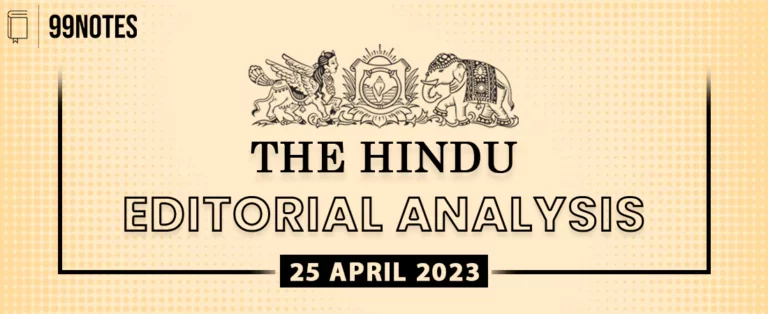19 June 2023 : The Hindu Editorial
The Hindu Editorial
19-June-2023
Daily Current Affairs For UPSC ,The Hindu Editorial Summary
1. Preparedness pays off: On Cyclone Biparjoy
Topic: GS3 – Disaster management
Context:
-
-
-
Cyclonic storm Biparjoy hit Gujarat and parts of Rajasthan, causing destruction, injuries, and cattle deaths.
-
-
More about the news:
-
-
-
The India Meteorological Department issued early reports on the cyclone’s trajectory, indicating it would affect coastal Saurashtra, Gujarat.
-
The storm was categorized as “very severe” with average wind speeds exceeding 115 kmph.
-
Precise prediction of cyclones and their impact is typically possible only 36-60 hours in advance.
-
Coastal infrastructure, communication networks, and livelihood patterns pose challenges for effective preparation.
-
Evacuation of individuals: District authorities in Gujarat evacuated nearly 100,000 people from coastal regions to shelters.
-
Reducing losses: Close to 30 central and state disaster relief teams were prepared for the cyclone’s impact.
-
Power outages: Power outages occurred in 1,092 villages, and significant damage was caused to electricity infrastructure.
-
-
Conclusion:
-
-
-
Efforts must be made to implement coastal-regulation-zone norms strictly, strengthen dwellings of coastal inhabitants, and protect natural barriers like mangroves to enhance resilience against future cyclones.
-
-
Note: Please refer Daily Current Affairs section of 17th June 2023 – Disaster management for cyclone for more details.
2. Emerging challenges to the Dravidian model
Topic: GS3 – Economy, Labour welfare.
Context:
-
-
-
The introduction of a Bill in Tamil Nadu to increase working hours from 8 to 12 sparked protests and raised concerns about workers’ rights.
-
-
More about the news:
-
-
-
The Dravidian model of inclusive industrialization in Tamil Nadu aims to address both economic and social inequalities.
-
Tamil Nadu has achieved structural change and poverty reduction simultaneously, but recent trends show a reversal with an increase in agricultural employment and a decline in manufacturing jobs in the state.
-
The claim that the Bill would attract more investments and create employment been criticised by many scholars.
-
Tamil Nadu historically balanced the needs of capital with safeguards for workers, resulting in a higher wage share in gross value added compared to other states.
-
However, there has been apprehensions about a decline in the share of directly employed workers and the abuse of contract labor, weakening worker protections.
-
Tamil Nadu’s competitive advantage lies in its skilled workforce, infrastructure, institutional ecosystem, and governance style, not just in labor law dilution or tax concessions.
-
The future of work requires a shift to knowledge-based industries, but Tamil Nadu faces challenges in education quality and skill development.
-
There is a need for a renewed approach to social policy and an industrialization strategy that ensures decent wages and dignified working conditions in Tamil Nadu.
-
-
Tussle between economic growth and dilution of labour laws:
In the pursuit of economic growth, Government often face a challenging dilemma – how to strike a balance between promoting economic development and safeguarding the rights and welfare of workers. This tug-of-war between economic growth and the dilution of labor laws has become a contentious issue in recent times:
The Case for Economic Growth:
-
-
-
Fostering economic growth: Advocates of labor law reforms argue that flexible regulations can attract investment, foster entrepreneurship, and stimulate job creation.
-
Better market adaptation: Relaxed labor laws allow businesses to adapt swiftly to market demands, enhance competitiveness, and encourage economic growth.
-
Ease of doing business: Supporters assert that by providing businesses with greater freedom in hiring and firing practices, labor law reforms can promote efficiency, productivity, and innovation.
-
Increasing FDI: Furthermore, proponents of labour law reforms argue that a favorable business environment created by relaxed labor laws can lead to increased foreign direct investment (FDI) and spur economic development.
-
Attracting multinational corporations: Relaxed labour laws can attract multinational corporations and stimulating domestic entrepreneurship, countries can experience higher levels of economic growth and improved living standards for their citizens.
-
-
The Case for strict Labour pause:
-
-
-
Undermining of worker’s rights: Dilution of labour laws can undermine workers’ rights, erode job security, and create precarious working conditions.
-
Exploitation of workers: Dilution of labor laws may lead to exploitative practices, including low wages, excessive working hours, and limited access to social security benefits.
-
Impact on vulnerable sections: Weakened labor protections may disproportionately impact vulnerable groups, such as women, migrant workers, and those in the informal sector, exacerbating social inequalities and perpetuating the cycle of poverty.
-
Hurdles to social progress: Erosion of labor rights can hinder social progress, compromising the overall well-being and dignity of workers.
-
-
Balancing Economic Growth and Worker Welfare:
-
-
-
Striking a balance between economic growth and worker welfare requires careful consideration and nuanced policy approaches.
-
Governments must recognize that sustainable development cannot be achieved at the expense of workers’ rights and social justice.
-
Government can pursue pro-growth strategies while simultaneously protecting workers by implementing comprehensive labor laws that ensure fair wages, safe working conditions, and social security provisions.
-
Balancing labor market flexibility with adequate protections, such as minimum wage regulations, limitations on working hours, and provisions for collective bargaining, can help safeguard workers’ rights without stifling economic growth.
-
Moreover, investing in education and skills development programs is essential to equip workers with the capabilities needed to thrive in a rapidly evolving labor market. By promoting lifelong learning initiatives, vocational training, and higher education, countries can empower their workforce and enable individuals to adapt to changing economic landscapes without compromising economic aspirations.
-
-
Conclusion:
The tussle between economic growth and the dilution of labor laws represents a complex challenge for policymakers worldwide. While economic growth is undoubtedly important for societal progress, it must not come at the expense of workers’ rights and dignity. Finding the right balance requires thoughtful policy choices that prioritize both economic development and the well-being of workers.
For Enquiry

19 June 2023 : The Hindu Editorial

19 June 2023 : Daily Current Affairs

Kurukshetra Summary, May 2023

17 June 2023 : Indian Express

17 June 2023 : Daily Quiz

16 June 2023 : Daily Quiz

15 June 2023 : Daily Quiz

14 June 2023 : Daily Quiz

13 June 2023 : Daily Quiz

12 June 2023 : Daily Quiz
The Hindu 19 June 2023 : The Hindu Editorial The Hindu Editorial
12-May-2023
Daily Current Affairs For UPSC ,The Hindu Editorial Summary
Facebook-f
Twitter
Youtube
1.Marriage…
Daily Current Affairs 19 June 2023 : Daily Current Affairs DAILY CURRENT AFFAIRS
19-June-2023
Daily Current Affairs For UPSC ,Daily Current affairs of The hIndu…
kurukshetra summary Kurukshetra Summary, May 2023 Chapter 1: Potential of the Rural Crafts
Introduction
India has an affluent tradition of rural crafts…
Indian Express 17 June 2023 : Indian Express Indian Express
17-June-2023
The Indian Express, CSE candidates can stay informed about current events…
Daily Quiz 17 June 2023 : Daily Quiz 17 june 2023 : Daily Quiz…
Daily Quiz 16 June 2023 : Daily Quiz 16 June 2023 : Daily Quiz…
Daily Quiz 15 June 2023 : Daily Quiz 15 June 2023 : Daily Quiz…
Daily Quiz 14 June 2023 : Daily Quiz 14 June 2023 : Daily Quiz…
Daily Quiz 13 June 2023 : Daily Quiz 13 June 2023 : Daily Quiz…
Daily Quiz 12 June 2023 : Daily Quiz 12 June 2023 : Daily Quiz…



